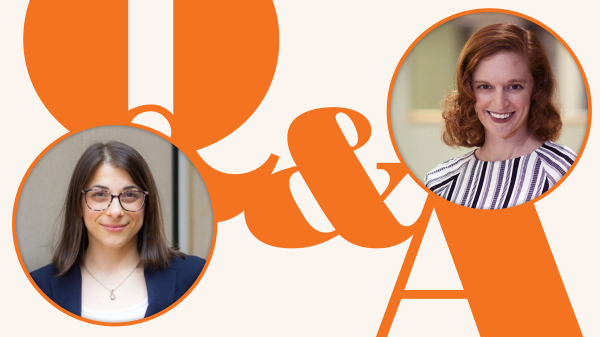
This fall, UVA students will be doing something increasingly rare: engaging thoughtfully and with curiosity across political and personal divides.
These students are part of the Civic Cornerstone Fellowship, a signature program of the Karsh Institute of Democracy developed by Program Director Stefanie Georgakis Abbott and School of Education and Human Development Associate Professor Rachel Wahl. During the Fellowship, students take part in sustained, structured conversations that treat dialogue not merely as a communication skill, but as a practice that shapes character. Guided by Wahl’s decade of research, the Fellowship blends dialogue with mindfulness exercises, faculty-led learning, and opportunities to reflect on one’s political views.
In its first year (2024–25), the Fellowship, then called the Student Dialogue Fellowship, engaged more than 300 undergraduate and graduate students from 11 of UVA's schools, representing fields from politics and public policy to medicine, architecture, and data science. Early surveys show meaningful gains in students’ ability to engage constructively.
In recognition of its unique model and impact, the Karsh Institute was awarded Wake Forest University’s Educating Character Initiative (ECI) grant, which will fund the Fellowship’s continuation and growth for the next three years.
We sat down with Wahl and Georgakis Abbott to discuss what it takes to foster these virtues, the strong student demand for the Fellowship, and how it’s already shaping the way participants approach disagreement.
Q: The Civic Cornerstone Fellowship emphasizes the development of civic and intellectual virtues like curiosity, empathy, and intellectual humility. What does that mean in practice, and why are these virtues so essential to democratic life today?
Wahl: In practice, this means listening with the intention to understand, being patient when understanding doesn’t come immediately, and being open to what we learn from others. This matters because free speech means little if nobody is listening. Democracy thrives when citizens’ views are more carefully formed. Perhaps most crucially, students are more likely to consider others as legitimate participants in democratic society when they understand each other better, making it less likely that they will try to exclude others from democratic participation.
Q: The Fellowship has grown quickly and drawn students from across UVA. What’s driving that interest, and how is it changing the way they engage?
Georgakis Abbott: Students tell us they crave opportunities for open inquiry, deep dialogue, reflection, and knowledge-building in spaces where they can engage with peers who hold different views and know they will be met with empathy rather than debate. Many come with little or no background in politics; they’re interested in current events, but especially in a structured environment where they can practice the “hard skills” of dialogue while forming relationships across differences.
Wahl: Students want a space to ask each other questions that are not always considered appropriate in daily life. They want to know what other people really think about divisive issues and why they see the world differently. But they are often afraid of saying the wrong thing or offending someone. This Fellowship gives them the structure, permission, and skills to ask hard questions and respond thoughtfully.
Q: Professor Wahl, you’re leading research to assess the Fellowship’s impact and better understand the conditions for constructive dialogue. What have you learned so far, and what will you explore next?
Wahl: The biggest shift we see is in how students understand and relate to one another. They often leave with the same core beliefs but a much higher opinion of those who disagree with them. When questions are rooted in curiosity and respect, students start asking themselves questions, too. They reflect more deeply, confront uncertainties, and consider why they believe what they do. They also become curious—rather than dismissive—about opposing views. Our research aims to identify the conditions that make these shifts possible, support students who struggle most, and measure the program’s impact one to three years later.
Q: The ECI grant is taking the Fellowship into a new phase. What will it make possible?
Georgakis Abbott: The ECI grant is critical to the Fellowship’s growth. It will allow us to run the program with greater capacity, while refining it with each cohort. Over the next three years, we’ll expand the Fellowship to two new campuses annually, and provide hands-on support, facilitator training, and a resource suite for institutions interested in hosting their own cohort. Our hope is to create an ongoing community for students across campuses to connect and continue practicing and building dialogue skills.
Wahl: In addition to ensuring the continuation of the Fellowship at UVA for at least the next three years, it also supports research to better understand what, when, and how students learn during the program. I am excited to see the program grow and to conduct research that allows us to better understand students’ experiences as well as to understand how dialogue may develop differently in different settings.
Q: How do you see the Civic Cornerstone Fellowship aligning with the broader mission of the Karsh Institute and its focus on democratic culture?
Georgakis Abbott: A robust democratic culture depends on people who can disagree respectfully, reflect on their own perspectives, and be open to other points of view. In today’s polarized environment, where we spend so much time in echo chambers, students rarely get structured opportunities to practice these skills. This program gives them that space, helping them develop the capacity for collaborative problem-solving and the habits essential for meaningful participation in democratic life.